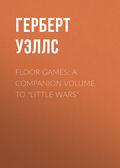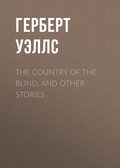
Герберт Джордж Уэллс
Mr. Britling Sees It Through
§ 9
It was Mr. Britling who broke silence. And when he drew his hands down from his face and spoke, he said one of the most amazing and unexpected things she had ever heard in her life.
"The only possible government in Albania," he said, looking steadfastly before him down the hill-side, "is a group of republican cantons after the Swiss pattern. I can see no other solution that is not offensive to God. It does not matter in the least what we owe to Serbia or what we owe to Italy. We have got to set this world on a different footing. We have got to set up the world at last – on justice and reason."
Then, after a pause, "The Treaty of Bucharest was an evil treaty. It must be undone. Whatever this German King of Bulgaria does, that treaty must be undone and the Bulgarians united again into one people. They must have themselves, whatever punishment they deserve, they must have nothing more, whatever reward they win."
She could not believe her ears.
"After this precious blood, after this precious blood, if we leave one plot of wickedness or cruelty in the world – "
And therewith he began to lecture Letty on the importance of international politics – to every one. How he and she and every one must understand, however hard it was to understand.
"No life is safe, no happiness is safe, there is no chance of bettering life until we have made an end to all that causes war…
"We have to put an end to the folly and vanity of kings, and to any people ruling any people but themselves. There is no convenience, there is no justice in any people ruling any people but themselves; the ruling of men by others, who have not their creeds and their languages and their ignorances and prejudices, that is the fundamental folly that has killed Teddy and Hugh – and these millions. To end that folly is as much our duty and business as telling the truth or earning a living…"
"But how can you alter it?"
He held out a finger at her. "Men may alter anything if they have motive enough and faith enough."
He indicated the atlas beside him.
"Here I am planning the real map of the world," he said. "Every sort of district that has a character of its own must have its own rule; and the great republic of the united states of the world must keep the federal peace between them all. That's the plain sense of life; the federal world-republic. Why do we bother ourselves with loyalties to any other government but that? It needs only that sufficient men should say it, and that republic would be here now. Why have we loitered so long – until these tragic punishments come? We have to map the world out into its states, and plan its government and the way of its tolerations."
"And you think it will come?"
"It will come."
"And you believe that men will listen to such schemes?" said Letty.
Mr. Britling, with his eyes far away over the hills, seemed to think. "Yes," he said. "Not perhaps to-day – not steadily. But kings and empires die; great ideas, once they are born, can never die again. In the end this world-republic, this sane government of the world, is as certain as the sunset. Only…"
He sighed, and turned over a page of his atlas blindly.
"Only we want it soon. The world is weary of this bloodshed, weary of all this weeping, of this wasting of substance and this killing of sons and lovers. We want it soon, and to have it soon we must work to bring it about. We must give our lives. What is left of our lives…
"That is what you and I must do, Letty. What else is there left for us to do?.. I will write of nothing else, I will think of nothing else now but of safety and order. So that all these dear dead – not one of them but will have brought the great days of peace and man's real beginning nearer, and these cruel things that make men whimper like children, that break down bright lives into despair and kill youth at the very moment when it puts out its clean hands to take hold of life – these cruelties, these abominations of confusion, shall cease from the earth forever."
§ 10
Letty regarded him, frowning, and with her chin between her fists…
"But do you really believe," said Letty, "that things can be better than they are?"
"But —Yes!" said Mr. Britling.
"I don't," said Letty. "The world is cruel. It is just cruel. So it will always be."
"It need not be cruel," said Mr. Britling.
"It is just a place of cruel things. It is all set with knives. It is full of diseases and accidents. As for God – either there is no God or he is an idiot. He is a slobbering idiot. He is like some idiot who pulls off the wings of flies."
"No," said Mr. Britling.
"There is no progress. Nothing gets better. How can you believe in God after Hugh? Do you believe in God?"
"Yes," said Mr. Britling after a long pause; "I do believe in God."
"Who lets these things happen!" She raised herself on her arm and thrust her argument at him with her hand. "Who kills my Teddy and your Hugh – and millions."
"No," said Mr. Britling.
"But he must let these things happen. Or why do they happen?"
"No," said Mr. Britling. "It is the theologians who must answer that. They have been extravagant about God. They have had silly absolute ideas – that He is all powerful. That He's omni-everything. But the common sense of men knows better. Every real religious thought denies it. After all, the real God of the Christians is Christ, not God Almighty; a poor mocked and wounded God nailed on a cross of matter… Some day He will triumph… But it is not fair to say that He causes all things now. It is not fair to make out a case against him. You have been misled. It is a theologian's folly. God is not absolute; God is finite… A finite God who struggles in his great and comprehensive way as we struggle in our weak and silly way – who is with us – that is the essence of all real religion… I agree with you so – Why! if I thought there was an omnipotent God who looked down on battles and deaths and all the waste and horror of this war – able to prevent these things – doing them to amuse Himself – I would spit in his empty face…"
"Any one would…"
"But it's your teachers and catechisms have set you against God… They want to make out He owns all Nature. And all sorts of silly claims. Like the heralds in the Middle Ages who insisted that Christ was certainly a great gentleman entitled to bear arms. But God is within Nature and necessity. Necessity is a thing beyond God – beyond good and ill, beyond space and time, a mystery everlastingly impenetrable. God is nearer than that. Necessity is the uttermost thing, but God is the innermost thing. Closer He is than breathing and nearer than hands and feet. He is the Other Thing than this world. Greater than Nature or Necessity, for he is a spirit and they are blind, but not controlling them… Not yet…"
"They always told me He was the maker of Heaven and Earth."
"That's the Jew God the Christians took over. It's a Quack God, a Panacea. It's not my God."
Letty considered these strange ideas.
"I never thought of Him like that," she said at last. "It makes it all seem different."
"Nor did I. But I do now… I have suddenly found it and seen it plain. I see it so plain that I am amazed that I have not always seen it… It is, you see, so easy to understand that there is a God, and how complex and wonderful and brotherly He is, when one thinks of those dear boys who by the thousand, by the hundred thousand, have laid down their lives… Ay, and there were German boys too who did the same… The cruelties, the injustice, the brute aggression – they saw it differently. They laid down their lives – they laid down their lives… Those dear lives, those lives of hope and sunshine…
"Don't you see that it must be like that, Letty? Don't you see that it must be like that?"
"No," she said, "I've seen things differently from that."
"But it's so plain to me," said Mr. Britling. "If there was nothing else in all the world but our kindness for each other, or the love that made you weep in this kind October sunshine, or the love I bear Hugh – if there was nothing else at all – if everything else was cruelty and mockery and filthiness and bitterness, it would still be certain that there was a God of love and righteousness. If there were no signs of God in all the world but the godliness we have seen in those two boys of ours; if we had no other light but the love we have between us…
"You don't mind if I talk like this?" said Mr. Britling. "It's all I can think of now – this God, this God who struggles, who was in Hugh and Teddy, clear and plain, and how He must become the ruler of the world…"
"This God who struggles," she repeated. "I have never thought of Him like that."
"Of course He must be like that," said Mr. Britling. "How can God be a Person; how can He be anything that matters to man, unless He is limited and defined and – human like ourselves… With things outside Him and beyond Him."
§ 11
Letty walked back slowly through the fields of stubble to her cottage.
She had been talking to Mr. Britling for an hour, and her mind was full of the thought of this changed and simplified man, who talked of God as he might have done of a bird he had seen or of a tree he had sheltered under. And all mixed up with this thought of Mr. Britling was this strange idea of God who was also a limited person, who could come as close as Teddy, whispering love in the darkness. She had a ridiculous feeling that God really struggled like Mr. Britling, and that with only some indefinable inferiority of outlook Mr. Britling loved like God. She loved him for his maps and his dreams and the bareness of his talk to her. It was strange how the straining thought of the dead Teddy had passed now out of her mind. She was possessed by a sense of ending and beginning, as though a page had turned over in her life and everything was new. She had never given religion any thought but contemptuous thought for some years, since indeed her growing intelligence had dismissed it as a scheme of inexcusable restraints and empty pretences, a thing of discords where there were no discords except of its making. She had been a happy Atheist. She had played in the sunshine, a natural creature with the completest confidence in the essential goodness of the world in which she found herself. She had refused all thought of painful and disagreeable things. Until the bloody paw of war had wiped out all her assurance. Teddy, the playmate, was over, the love game was ended for ever; the fresh happy acceptance of life as life; and in the place of Teddy was the sorrow of life, the pity of life, and this coming of God out of utter remoteness into a conceivable relation to her own existence.
She had left Mr. Britling to his atlas. He lay prone under the hedge with it spread before him. His occupation would have seemed to her only a little while ago the absurdest imaginable. He was drawing boundaries on his maps very carefully in red ink, with a fountain pen. But now she understood.
She knew that those red ink lines of Mr. Britling's might in the end prove wiser and stronger than the bargains of the diplomats…
In the last hour he had come very near to her. She found herself full of an unwonted affection for him. She had never troubled her head about her relations with any one except Teddy before. Now suddenly she seemed to be opening out to all the world for kindness. This new idea of a friendly God, who had a struggle of his own, who could be thought of as kindred to Mr. Britling, as kindred to Teddy – had gripped her imagination. He was behind the autumnal sunshine; he was in the little bird that had seemed so confident and friendly. Whatever was kind, whatever was tender; there was God. And a thousand old phrases she had read and heard and given little heed to, that had lain like dry bones in her memory, suddenly were clothed in flesh and became alive. This God – if this was God – then indeed it was not nonsense to say that God was love, that he was a friend and companion… With him it might be possible to face a world in which Teddy and she would never walk side by side again nor plan any more happiness for ever. After all she had been very happy; she had had wonderful happiness. She had had far more happiness, far more love, in her short years or so than most people had in their whole lives. And so in the reaction of her emotions, Letty, who had gone out with her head full of murder and revenge, came back through the sunset thinking of pity, of the thousand kindnesses and tendernesses of Teddy that were, after all, perhaps only an intimation of the limitless kindnesses and tendernesses of God… What right had she to a white and bitter grief, self-centred and vindictive, while old Britling could still plan an age of mercy in the earth and a red-gold sunlight that was warm as a smile from Teddy lay on all the world…
She must go into the cottage and kiss Cissie, and put away that parcel out of sight until she could find some poor soldier to whom she could send it. She had been pitiless towards Cissie in her grief. She had, in the egotism of her sorrow, treated Cissie as she might have treated a chair or a table, with no thought that Cissie might be weary, might dream of happiness still to come. Cissie had still to play the lover, and her man was already in khaki. There would be no such year as Letty had had in the days before the war darkened the world. Before Cissie's marrying the peace must come, and the peace was still far away. And Direck too would have to take his chances…
Letty came through the little wood and over the stile that brought her into sight of the cottage. The windows of the cottage as she saw it under the bough of the big walnut tree, were afire from the sun. The crimson rambler over the porch that she and Teddy had planted was still bearing roses. The door was open and people were moving in the porch.
Some one was coming out of the cottage, a stranger, in an unfamiliar costume, and behind him was a man in khaki – but that was Mr. Direck! And behind him again was Cissie.
But the stranger!
He came out of the frame of the porch towards the garden gate…
Who – who was this stranger?
It was a man in queer-looking foreign clothes, baggy trousers of some soft-looking blue stuff and a blouse, and he had a white-bandaged left arm. He had a hat stuck at the back of his head, and a beard…
He was entirely a stranger, a foreigner. Was she going insane? Of course he was a stranger!
And then he moved a step, he made a queer sideways pace, a caper, on the path, and instantly he ceased to be strange and foreign. He became amazingly, incredibly, familiar by virtue of that step…
No!
Her breath stopped. All Letty's being seemed to stop. And this stranger who was also incredibly familiar, after he had stared at her motionless form for a moment, waved his hat with a gesture – a gesture that crowned and scaled the effect of familiarity. She gave no sign in reply.
No, that familiarity was just a mad freakishness in things.
This strange man came from Belgium perhaps, to tell something about Teddy…
And then she surprised herself by making a groaning noise, an absurd silly noise, just like the noise when one imitates a cow to a child. She said "Mooo-oo."
And she began to run forward, with legs that seemed misfits, waving her hands about, and as she ran she saw more and more certainly that this wounded man in strange clothing was Teddy. She ran faster and still faster, stumbling and nearly falling. If she did not get to him speedily the world would burst.
To hold him, to hold close to him!..
"Letty! Letty! Just one arm…"
She was clinging to him and he was holding her…
It was all right. She had always known it was all right. (Hold close to him.) Except just for a little while. But that had been foolishness. Hadn't she always known he was alive? And here he was alive! (Hold close to him.) Only it was so good to be sure – after all her torment; to hold him, to hang about him, to feel the solid man, kissing her, weeping too, weeping together with her. "Teddy my love!"
§ 12
Letty was in the cottage struggling to hear and understand things too complicated for her emotion-crowded mind. There was something that Mr. Direck was trying to explain about a delayed telegram that had come soon after she had gone out. There was much indeed that Mr. Direck was trying to explain. What did any explanation really matter when you had Teddy, with nothing but a strange beard and a bandaged arm between him and yourself? She had an absurd persuasion at first that those two strangenesses would also presently be set aside, so that Teddy would become just exactly what Teddy had always been.
Teddy had been shot through the upper arm…
"My hand has gone, dear little Letty. It's my left hand, luckily. I shall have to wear a hook like some old pirate…"
There was something about his being taken prisoner. "That other officer" – that was Mr. Direck's officer – "had been lying there for days." Teddy had been shot through the upper arm, and stunned by a falling beam. When he came to he was disarmed, with a German standing over him…
Then afterwards he had escaped. In quite a little time he had escaped. He had been in a railway station somewhere in Belgium; locked in a waiting-room with three or four French prisoners, and the junction had been bombed by French and British aeroplanes. Their guard and two of the prisoners had been killed. In the confusion the others had got away into the town. There were trucks of hay on fire, and a store of petrol was in danger. "After that one was bound to escape. One would have been shot if one had been found wandering about."
The bomb had driven some splinters of glass and corrugated iron into Teddy's wrist; it seemed a small place at first; it didn't trouble him for weeks. But then some dirt got into it.
In the narrow cobbled street beyond the station he had happened upon a woman who knew no English, but who took him to a priest, and the priest had hidden him.
Letty did not piece together the whole story at first. She did not want the story very much; she wanted to know about this hand and arm.
There would be queer things in the story when it came to be told. There was an old peasant who had made Teddy work in his fields in spite of his smashed and aching arm, and who had pointed to a passing German when Teddy demurred; there were the people called "they" who had at that time organised the escape of stragglers into Holland. There was the night watch, those long nights in succession before the dash for liberty. But Letty's concern was all with the hand. Inside the sling there was something that hurt the imagination, something bandaged, a stump. She could not think of it. She could not get away from the thought of it.
"But why did you lose your hand?"
It was only a little place at first, and then it got painful…
"But I didn't go into a hospital because I was afraid they would intern me, and so I wouldn't be able to come home. And I was dying to come home. I was – homesick. No one was ever so homesick. I've thought of this place and the garden, and how one looked out of the window at the passers-by, a thousand times. I seemed always to be seeing them. Old Dimple with his benevolent smile, and Mrs. Wolker at the end cottage, and how she used to fetch her beer and wink when she caught us looking at her, and little Charlie Slobberface sniffing on his way to the pigs and all the rest of them. And you, Letty. Particularly you. And how we used to lean on the window-sill with our shoulders touching, and your cheek just in front of my eyes… And nothing aching at all in one…
"How I thought of that and longed for that!..
"And so, you see, I didn't go to the hospital. I kept hoping to get to England first. And I left it too long…"
"Life's come back to me with you!" said Letty. "Until just to-day I've believed you'd come back. And to-day – I doubted… I thought it was all over – all the real life, love and the dear fun of things, and that there was nothing before me, nothing before me but just holding out – and keeping your memory… Poor arm. Poor arm. And being kind to people. And pretending you were alive somewhere… I'll not care about the arm. In a little while… I'm glad you've gone, but I'm gladder you're back and can never go again… And I will be your right hand, dear, and your left hand and all your hands. Both my hands for your dear lost left one. You shall have three hands instead of two…"







